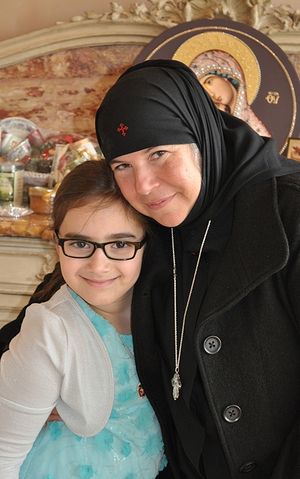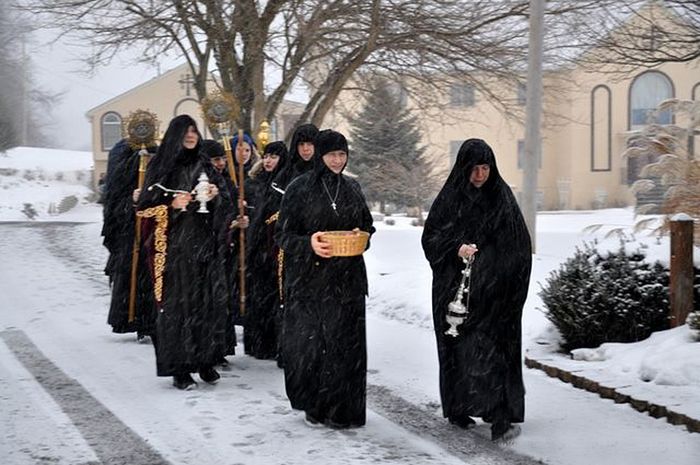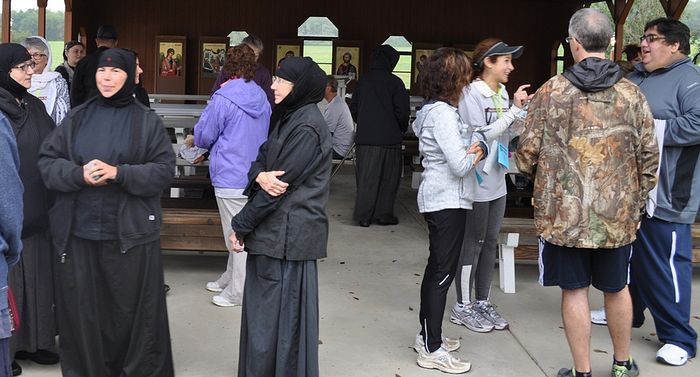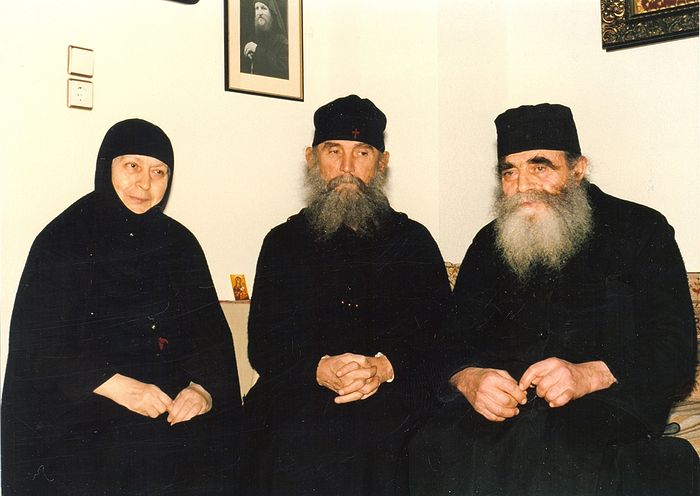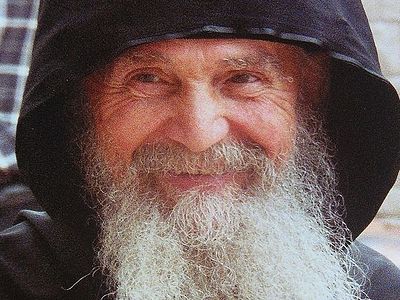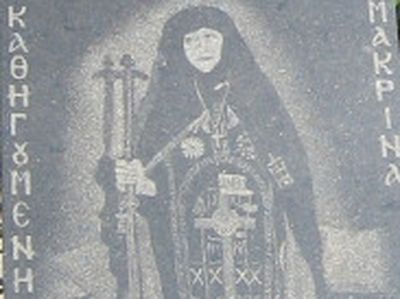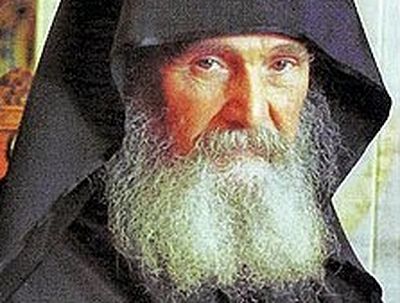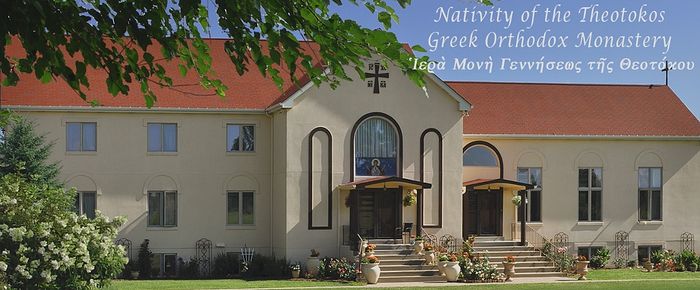
The first monastery built by Elder Ephraim in America was the women’s monastery of the Nativity of the Most Holy Theotokos in Saxonburg, PA. Elder Ephraim founded it in 1989. Pilgrims meet here a peaceful corner of nature, where you can forget for a time your worldly cares and anxieties and you can immerse yourself in a world of silence and prayer. The sisters of the monastery labor purely for the prayer of the heart and mind. Here and there you here: “Lord Jesus Christ, Son of God, have mercy on me.” The Byzantine singing in church during the services leaves pilgrims in awe.
The monastery is a missionary center. It is an oasis in the desert of modern life for those who are experiencing spiritual hunger. Here the afflicted receive spiritual counsel and consolation in sorrows. Children, who with their pure souls share in the nun’s joy in the Lord, especially love to visit the monastery.
Fifteen sisters are currently laboring in the monastery (thirteen nuns, two novices). They themselves earn money for bread and the monastery necessities. The monastery has an active icon studio, with the nuns making icons on wood and stone, they work at embroidery and sewing Baptismal garments and priestly vestments, they tie prayer ropes, decorate candles for Weddings and Baptisms, and they produce soap. There is also a monastery garden.
The first abbess of the monastery was Gerontissa Taxiarchia. Elder Ephraim of Philotheou, her spiritual father, called her here from a Greek monastery in 1989. Gerontissa Taxiarchia was a clairvoyant eldress, having acquired the gifts of ceaseless prayer and love of Christ.
The monastery’s current abbess, Gerontissa Theophano, joined the sisterhood in 1990. Under her spiritual direction the sisters reverently preserve the traditions inherited from their spiritual mother, Gerontissa Taxiarchia. Gerontissa Theophano kindly agreed to speak with us.
* * *
—Dear Mother Theophano, could you tell us about your path to the monastery?
—My mother was born in Greece, and my father was born right on the eve of the Asia Minor catastrophe in Smyrna.[1] Then they moved to America.
I met Elder Ephraim in New York. This is how I got acquainted with him: at that time I was a young girl. I didn’t want to go to college but dreamt of becoming a clothing designer, but my dad insisted that I get a higher education. He said to us, his children: “You must receive a higher education so you can provide for yourselves.” My dad was very concerned about our independence. “May it be blessed,” I answered him. As my father said, so I did.
I chose the history department and became an historian. In the end it turned out that Elder Ephraim had begun to come to the city where my university was, and I went to him for Confession. This was in the 1980s—the very first years when he had just started coming to America. So that’s why I met Elder Ephraim. Had I not obeyed my father I would never have met the elder. When we obey our parents we always receive benefit from it.
Eight years passed between the day I met the elder and the death of my mother. That whole time I was troubled by the thought: “I’m not sure that I really want to become a nun. Maybe it’s better for me to get married?” I had such ambiguity. Sometimes I would dream of becoming a mother, and moreover a modern mother. We didn’t know anything about monasticism. We never saw a single nun.
But after my mom died I went to the elder and said: “Elder, 50/50, I can’t choose: marriage or monasticism,” and he said to me: “You know what I want from you, so decide. Pray to the Mother of God!” After you hear something like that, can you think about marriage? So, I rendered obedience here. My father was very strict, incidentally, like Elder Ephraim. I moved from one strict father to another.
I came here, to the monastery, in March 1990. At first we had just a small country house with two bedrooms and nothing more. There were three of us: Gerontissa Taxiarchia, me, and one other sister.
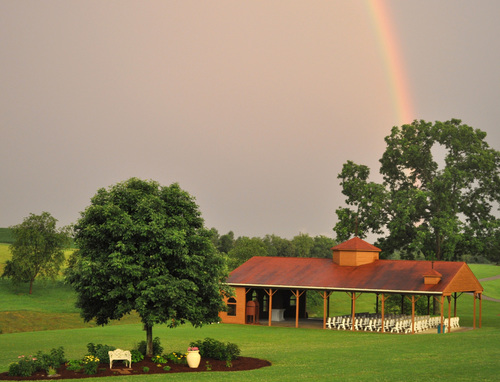
—Could you tell us how your monastery was built?
—At that time our bishop was Archbishop Iakovos, who was not very disposed towards monasticism, but it was God’s will that he agree with Elder Ephraim on building the monastery. Within a year after the monastery was built in 1992 we had ten sisters—the monastery was full.
A miraculous story occurred with the acquiring of the land for our monastery. The owners of the farm, where the monastery is now built, were a Greek couple. They had no children. During the Depression they had no money—just one farm. But in 1942, as the priest told me, they demanded that the owner pay his tax debt. He had on hand precisely one fourth of what he owed the government. Then he prayed to the Mother of God: “Panagia, if they agree to accept this amount, to cover all my arrears, then I will donate this property to you for your monastery.” And so it happened—the officials were satisfied with a quarter of the sum, and the spouses decided between themselves that, inasmuch as they had no children, they would give the farm to the Church on the condition that a monastery would be built here.
Additionally, one family, from among the spiritual children of Elder Ephraim living in this area, bought the property next to ours to build housing for their children, but it ended up that they gave us the spot so that, God-willing, we can expand.
—What did you build first?
—First a small building with ten cells for the sisters was built. Then we built one room over the garage with another four cells. Then we expanded the old farmhouse and turned it into an icon studio. We hope to expand it even more. Just today Elder Ephraim said to me: “What’s with your buildings?” I answered that we don’t have money, but he said: “It’s nothing—continue, continue…”
—And how about the church?
—The church is connected to the facilities where we live. It’s a chapel. In 1996 we built another chapel, of St. Seraphim of Sarov, in the forest. We have on our site some woods, and there, a small wooden church.
—Something like a skete?
—Yes, precisely like a skete!
—How do you spend the day?
—Right now it’s difficult for us to follow our usual schedule because of construction. We recently discovered that our whole building has rotted. We had to vacate the premises and to begin major repairs. We try to face this situation with patience. Thank God we already finished the church, and now we’re doing our cells and the attic, where the damage was especially strong… But, glory to God, glory to God… All is well. We have our elder, and by his prayers everything will be alright.
When we weren’t doing repairs… let me tell you about how we live when we weren’t doing repairs and we had a priest… right now we’re temporarily without a priest. Usually our day starts at six in the morning with Liturgy or a Moleben, and then is trapeza, then we go to our obediences. The next meal is at one in the afternoon, and then we serve Vespers and Small Compline together, and after that we retire to our cells for rest. Then we work and pray again.
—Dear Gerontissa, perhaps you can share some edifying stories from the life of your monastery?
—The first years of the monastery were especially blessed—the Lord gave us grace to start the monastery. Those years were full of miracles—it was something special. The spiritual mother of our abbess Gerontissa Taxiarchia visited us—Gerontissa Macrina. Blessed Gerontissa Macrina (1921-1995) was the gerontissa of the Monastery of Panagia Hodigitria, near the city of Volos, and was the spiritual child of Elder Joseph the Hesychast and our elder Ephraim. Gerontissa led the monastery for more than thirty years, acquiring numerous spiritual gifts and was blessed with exalted spiritual states.
When she visited us it was as if we had gathered everyone together—mother, daughter, and us, the granddaughters. Also, Elder Ephraim visited us. The whole family was gathered.
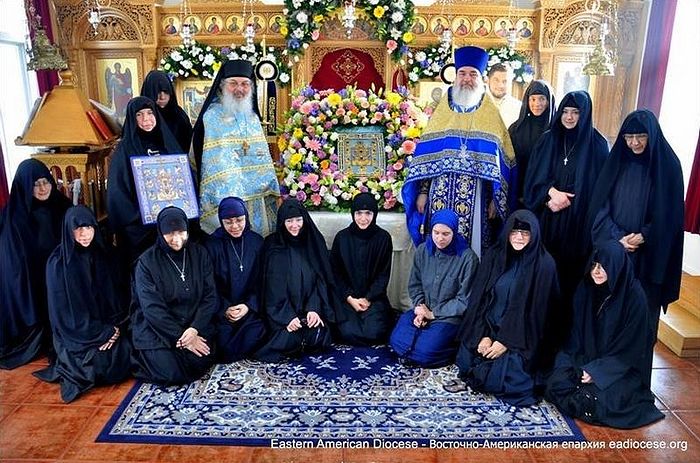 The sisterhood of the monastery during the visitation of the wonderworking Kursk Root Icon of the Mother of God.
The sisterhood of the monastery during the visitation of the wonderworking Kursk Root Icon of the Mother of God.
This meeting gave us the opportunity to realize something important. Those who were born in America don’t understand the depth of our history and don’t truly understand Apostolic Tradition. What kind of tradition is there in America?! Our churches in America are new and modern. It’s especially unpleasant to speak about Tradition. So when we saw our elder and both gerontissas at the same time, we understood that Tradition exists, that succession exists. This greatly strengthened us in Orthodoxy. It also helped us to later cope with temptations.
It was not easy when people came to us in the monastery and asked why we don’t change such and such. It was very difficult to keep the Greek language, very difficult, especially when I took upon myself the obedience of abbess. The priest immediately suggested to change something. I had to tell him: “Excuse me, but what I received from the hands of my elders, I cannot change.”
We had a variety problems. Our main orientation is missionary. In such situations it’s hard to talk about the real monastic life. Here we have Mexico, Guatemala. What don’t we have!? We have to speak with everyone, and to consider everyone.
Let’s return to Gerontissa Macrina. Our Gerontissa Taxiarchia told us that many priests, archimandrites, other gerontissas, and even bishops would go to Portaria to Gerontissa Macrina for advice. Everyone sought her out. They called her “Basil the Great” because she was very strict in the very beginning.
But when I saw her, she was love itself. I’ll tell you how I met her. My mother died when I was twenty-three. Shortly before her death Elder Ephraim came to us to confess mama for the last time. He said to me: “My girl, when it happens, when your mama departs to the Lord, immediately call Philotheou so the fathers can begin to commemorate her for forty days.” Immediately after that he flew to England to be with Gerontissa Macrina in the hospital so I was unable to communicate with him directly, and I had no one to comfort me in my grief.
On the day that my mother died, on the eve of the Nativity of Christ, I had a dream, as if I was a child of ten-twelve years again and I was sitting together with other children in some beautiful place. The children around me were playing, but I didn’t play with them, but just sat. And some unknown woman in black came over to us and asked me: “My child, why aren’t you playing with the other children, and why do you look so sad?” I answered her: “I’m sad because my mama died.” “No, my girl, she didn’t die—she departed to Christ. Don’t be sad; she is now with Christ.” At that moment I woke up.
I told no one about this dream. Only after I found myself in the monastery did I tell this dream to Gerontissa Taxiarchia, and she said to me: “Maybe it was the Most Holy Theotokos?” I said: “No, it seems me it wasn’t the Panagia, but some gerontissa.”
When we went to Portaria with Gerontissa Taxiarchia and I saw Gerontissa Macrina for the first time, I immediately recognized her as the gerontissa in my dream. When Gerontissa Macrina spoke with me and I told her my whole history, she answered me: “I knew about the death of your mother, my child, and therefore I came to you in order to console you.”
—Thank you for this wonderful conversation, dear Gerontissa Theophano!
—May God save you!
